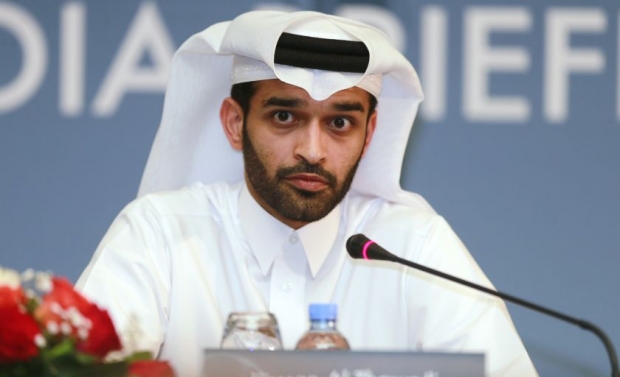By Andrew Warshaw
November 9 – The chief organiser of the 2022 World Cup in Qatar has dismissed any suggestion of the Gulf state being stripped of host status by saying it is a “done deal.”
Hassan al-Thawadi, secretary-general of the Supreme Committee for Delivery and Legacy, has kept a relatively low profile in recent months but has given his most forthright response to date to Qatar being the subject of an ongoing investigation, together with 2018 hosts Russia, being carried out by Switzerland’s Attorney General office.
Shrugging off corruption and human rights concerns, al-Thawadi told the Arabic daily Al-Sharq newspaper that there was no way Qatar could be sanctioned over the bid process.
“The 2022 World Cup will be held in Qatar, the first in a Middle Eastern, Arab and Muslim country,” said Al-Thawadi. “It is a done deal. I am totally confident our file is clean.”
Although nothing to do with the bid process per se, much of the criticism directed at Qatar by human rights groups relates to treatment of migrant workers helping to build World Cup venues. The Qatari authorities are working towards abolishing the antiquated kafala system which ties workers to their employers but critics say reforms do not go far enough.
Last month Qatar announced its first “work-related” death with regard to World Cup stadiums and al-Thawadi made it clear the matter will not be swept under the carpet. “What concerns us now is that this accident is not to be repeated. There is a comprehensive investigation at the moment and we are going to finish it soon,” he said.
He also addressed the as yet unresolved issue of how many stadiums will be built. Qatar’s successful bid allowed for up to 12 venues to be used but al-Thawadi gave the biggest indication yet that no more than eight will be constructed given the size of the country – which would represent the fewest since the 1978 tournament. “We are confident that we will not be asked to implement twelve stadiums,” he said. “We feel that eight stadiums is enough for Qatar.”
On the thorny subject of the consumption of alcohol, he made it clear in no uncertain terms what the rules will be. Drinking of alcohol is not be illegal in Qatar and it is freely available in some hotels, while foreigners who live there can buy drink after applying for a licence.
But overdoing it in public is prohibited. “There will be no alcohol consumption on the streets, squares and public places and that is final,” said al-Thawadi.
Qatari officials estimated that 500,000 fans will pour in for the World Cup and allowed to consume alcohol in designated areas. But creating a delicate balancing act between its own cultural traditions and FIFA requirements – one of its sponsors is Anheuser-Busch InBev – will be a major challenge. Brazil initially refused to sell alcohol inside stadiums at 2014 but had to relent after pressure from FIFA.
At a sports conference in Doha, al-Thawadi took a slightly more conciliatory stance suggesting special courts would be set up during the tournament to deal “very gently” with alcohol-consuming fans who break the law in what is a Muslim state.
“I know in South Africa (in 2010) there were specific courts established during the World Cup for this kind of thing, and that is something we were discussing with FIFA,” he said.
“In relation to drunk fans it will be as it is anywhere else. Anyone who is rowdy, anyone who breaches the law, will be very gently – depending on how they react – taken care of in a manner to make sure that people are not disrupting the public order,” said al-thawadi. “Everyone will be able to have fun and be exposed to Qatari culture.”
Contact the writer of this story at moc.l1713308956labto1713308956ofdlr1713308956owedi1713308956sni@w1713308956ahsra1713308956w.wer1713308956dna1713308956

